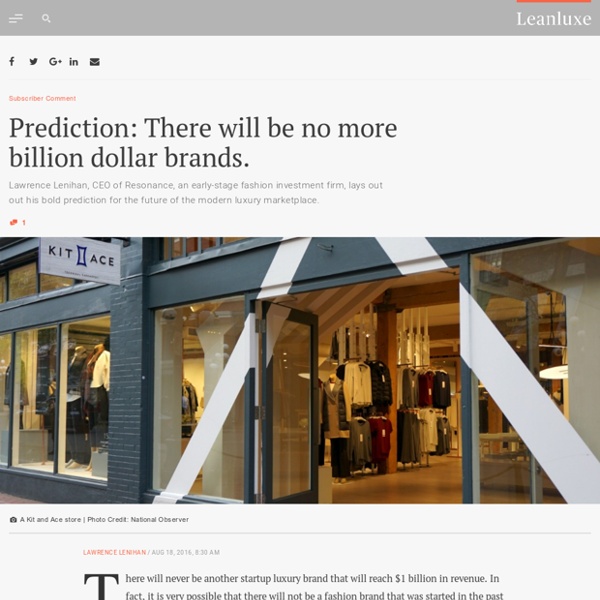



Economy Of Fashion: How Different Trends Reflect The Financial State It's common knowledge fashion is cyclical in nature. The concept of “newness” in fashion doesn't refer to the premiere of a trend, but rather its revival. Why fashion cycles in this manner, however, is less obvious. There are lots of factors at play: cultural trends, politics, celebrity influence. One one of the most surprising factors to influence the cycle of fashion, though, is the state of the global economy. If you think about it, it makes sense. During tougher times, if you need new clothes, the focus is less on passing fads and more on classic, quality pieces worth the expenditure because they’ll last (which also aids in cutting down cost per wear). As FIT professor John Mincarelli tells ABC News, “In rough economic times, people shop for replacement clothes,” adding “basics” prevail during an economic downturn. Economist George Taylor was the first to notice the correlation between fashion and the economy; he developed the “Hemline Theory” to describe his findings. Pinterest How?
Fashion house Balmain sold to Qatar's Mayhoola sovereign wealth fund | Fashion The Qatari investment fund that owns the Italian Valentino label will take over the French fashion house Balmain, which has become a favourite of film stars, the adviser for the acquisition has announced. “After completing this transaction Mayhoola for Investments will hold 100% of Balmain’s capital,” said the merger and acquisitions company Bucephale Finance. The French financial daily Les Echos in reporting on the acquisition said the Qataris offered €485m (£372m) for Balmain, which is 70% held by the heirs of the former CEO, Alain Hivelin, who died in December 2014, with the remaining 30% held by management. The reported Qatari offer was higher than sale estimates of between €300m-€400m. Mayhoola is an investment vehicle supported by the emir of Qatar. Balmain was started in 1945 by designer Pierre Balmain and has passed through several hands and periods of financial difficulty over the years. Since 2011 Balmain has gained added momentum under artistic director Olivier Rousteing.
The Art of Disclosure: Fashion’s Influence Economy and the FTC | Intelligence | BoF NEW YORK, United States — This September, lifestyle guru Aimee Song’s first book, "Capture Your Style: Transform Your Instagram Images, Showcase Your Life and Build the Ultimate Platform," will hit retailers. And if the size of her 3.6 million-strong Instagram following is any indication, it’s sure to be a commercial success. A mere mention in one of Song’s Instagram posts is powerful marketing, attracting tens of thousands of likes and hundreds of comments. It’s little wonder, then, that companies from Laura Mercier to Dior have paid her to market their brands and products to her followers. Song is something of a poster child for fashion’s lucrative influencer economy from which top digital stars generate hundreds of thousands — and, in some cases, millions — of dollars each year in income, not to mention perks like free product, travel and meals. Are consumers being deceived? The guidelines do clearly delineate when and where disclosures should take place, however. Related Articles:
How fashion is shaping the UK economy | Summit London celebrated its 61st Fashion Week this year London celebrated its 61st Fashion Week (LFW) last February, a highlight of the international fashion and retail calendar which turned global attention to the UK. No longer known as the ‘little sister’ of the big four fashion capitals, London is firmly on the map. It is now seen as the hottest and most exciting capital, creating and nurturing successful global fashion brands. As Changemakers in Retail, it is critical that we are up to speed on the trends, consumer insights and innovation & technology in the fashion industry. This season we were lucky enough to attend some of the shows, and were certainly not let down by the creativity and pride that shone through from our British designers. Despite the glitz, the glamour and the all-night parties, a more serious note prevailed, which is the important financial impact that the British fashion industry is having on our UK economy – £26billion to be precise!